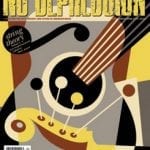Various Artists – Tradition in transition
It’s Saturday morning at Merlefest in late April 2007, and the main stage is a whirlwind of rapid-fire musical collaborations. Leonard Podolak of Canadian string band the Duhks is playing ringmaster to what has been billed the “New Generation Super Jam” — an hour-and-a-half free-for-all featuring members of the Duhks, Uncle Earl, the Infamous Stringdusters and Crooked Still, plus a couple stray guests.
“This is all about making new music and having fun,” Podolak explains as he bids the crowd good morning. “You’re not going to hear sets from our bands this morning. We’re going to make it up in the back, as whatever’s happening onstage.”
Singers and pickers dash back and forth from the wings in smaller and larger spontaneous configurations, creating a hectic but joyful sensory-overload of talented young musicians tossing caution to the wind. The Stringdusters’ Jeremy Garrett gathers various voices for an a cappella gospel number. The Duhks’ new singer, Sarah Dugas, sings a Cajun song in French. Uncle Earl’s Kristin Andreassen steps out front for a clogging solo during a fiddle tune. Crooked Still singer Aoife O’Donovan introduces “the craziest bluegrass cello player that the world has ever seen,” Rushad Eggleston, who convenes an off-the-cuff approximation of the Wild Band Of Snee (a zany Dr. Seussian side-project with song titles such as “Gree-himfeny” and “Back To The Nork”). The set closes with the entire cast onstage for the trad staple “Old Joe Clark”, but it’s a merry madhouse as everyone seeks to blend in with everyone else.
The common bond that brought these players together may have been their love for traditional music — but at this moment, it’s all about reaching beyond their roots to create something new, right here, right now.
And so it stands, at the dawn of 2008, for the bigger picture of this loose-knit string-band community — as exciting and innovative a confederacy of musicians as we have seen in at least a decade. And yet every one of these acts is in the midst of some kind of significant transition.
In some cases it’s the departure of key members, forcing acts to reconfigure in various ways. With others, it’s a matter of side-projects that could potentially take center stage. For many, it’s more of an internal identity shift, a desire to swing the balance between traditionalism and originality further toward the latter. And then there’s the outside possibility that, for at least one of these string bands — one that was not onstage this April morning — a major mainstream breakthrough may be just over the horizon.
All of which begs one fundamental question, for everyone involved:
Where do we go from here?
ROLL WITH THE CHANGES
It’s hard to imagine a more significant alteration to a band’s lineup than the departure of a lead singer, which makes the challenge to Winnipeg band the Duhks arguably the most significant of all those facing the string-band community. This transition isn’t news — Jessee Havey announced she was leaving the band a year ago — but its impact will soon be fully apparent when the Duhks issue their next album this summer with new singer Sarah Dugas.
It’s a major change, as Havey was not only a talented vocalist but also a striking visual presence in the band’s live shows. During her five years with the band, the Duhks had risen from Canadian festival darling to firmly established international roots act, with a Grammy nomination (for a song on their 2006 disc Migrations) to their credit.
Comparing Dugas to Havey, however, is essentially apples-and-oranges pointless, as the two bring widely different assets to the table. Dugas is French-Canadian, which is bound to steer the future of the Duhks in different directions — particularly in light of the fact that her brother, Christian Dugas, also has just joined the Duhks on drums, replacing longtime percussionist Scott Senior.
Banjo player and band founder Leonard Podolak acknowledged the impact of the changes on the band’s newly recorded album in a late-January telephone interview from Scotland, where the band was performing at the Celtic Connections festival.
“They bring in so many influences that they’re actually aligned on,” Podolak says of the Dugas siblings. “They have this sort of cool traditional French-Canadian background that’s in their blood…but at the same time, they also have played in funk bands and R&B bands and played so much other kinds of music.
“What’s really exciting now with the lineup change is that we’re actually in a place now where we can play so many more different kinds of music,” he continued. “Or put so many more influences into the music we play that gives it sort of a bigger scope and a bigger dynamic range.”
The addition of Christian Dugas — who played for several years with Podolak in Scruj MacDuhk, a precursor to the Duhks — is an interesting turn of events, given that a blog entry on Havey’s MySpace page last July indicated Christian had been recruited to play in her new musical endeavor (tentatively dubbed Jessee Havey & the Quirks at that time). As of late-January, Havey’s last blog-entry to her MySpace page was on August 1; her future plans remain unclear, though the one song she posted on her MySpace site last spring, “Can’t Be Bothered”, suggests she clearly has a bold solo vision in mind, whenever the rest of the gears get in motion.
The MySpace page for departed Crooked Still cellist Rushad Eggleston has been much more regularly updated, yet is similarly ambiguous about his future direction. As of late January, Eggleston’s new project with drummer/keyboardist Gabriel Cazes had been christened the Friendly Bunnies, after he’d retired the Wild Band Of Snee moniker and reconsidered the wisdom of their initial choice, Butt Wizards.




